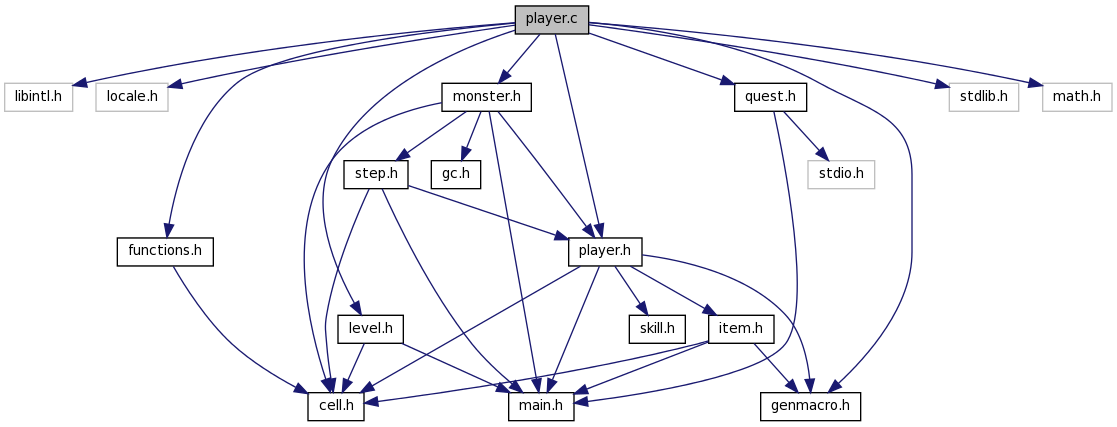player.c File Reference
#include <libintl.h>#include <locale.h>#include "player.h"#include "level.h"#include "monster.h"#include "functions.h"#include "quest.h"#include "genmacro.h"#include <stdlib.h>#include <math.h>
Include dependency graph for player.c:

Functions | |
| void | createplayer (struct cell *level, int size, int race, int profession) |
| Creates player and puts it into world. | |
| int | getplayer (struct cell *level, int size) |
| Finds a player in the world. | |
| struct player * | getplayer_pointer (struct cell *level, int size) |
| Wrapper around getplayer (). | |
| int | moveplayer (struct cell *level, int columns, int rows, int dir) |
| Moves player on one square in specified direction. | |
| int | opendoor (struct leveldata ld, int columns, int rows, int dir) |
| Opens a door. | |
| int | closedoor (struct cell *level, int columns, int rows, int dir) |
| Closes a door. | |
| struct item * | get_item_by_key (struct player pl, char key) |
| Gets item by its key (you can see it in inventory window). | |
| void | addexp (struct player *pl, int dif) |
| Adds expirience points to player. | |
| int | checklevel (struct player *pl) |
| Checks if player is able to get new level. | |
| struct exit_code | dodmg_topl (struct player *pl, int dmg) |
| Does damage to player. | |
| void | add_item_toinv (struct player *pl, struct item itm) |
| Adds item to inventory. | |
| void | remove_item_frominv (struct player *pl, struct item itm) |
| Removes item from inventory. | |
Function Documentation
Adds item to inventory.
- Parameters:
-
pl - Player itm - item
Here is the call graph for this function:

| void addexp | ( | struct player * | pl, | |
| int | dif | |||
| ) |
Adds expirience points to player.
- Parameters:
-
dif - difficulty of killed monster
Warning: use this function instead of accessing player::xp directly
| int checklevel | ( | struct player * | pl | ) |
Checks if player is able to get new level.
| int closedoor | ( | struct cell * | level, | |
| int | columns, | |||
| int | rows, | |||
| int | dir | |||
| ) |
Closes a door.
See opendoor ()
Here is the call graph for this function:

| void createplayer | ( | struct cell * | level, | |
| int | size, | |||
| int | race, | |||
| int | profession | |||
| ) |
Creates player and puts it into world.
- Parameters:
-
level - Level size - Size of level race - Race of new player
- profession of new player
Here is the call graph for this function:

Does damage to player.
Hits player when monster has turn
- Parameters:
-
pl - Player dmg - Damage without respect to player's AC
Gets item by its key (you can see it in inventory window).
- Parameters:
-
player - Owner of inventory key - symbolic key
- Returns:
- pointer to item in inventory on success or NULL
| int getplayer | ( | struct cell * | level, | |
| int | size | |||
| ) |
Finds a player in the world.
- Parameters:
-
level - Level where player can be found size - Size of level
- Returns:
- Number of cell where player is stored
Wrapper around getplayer ().
- Returns:
- Pointer to player
Here is the call graph for this function:

| int moveplayer | ( | struct cell * | level, | |
| int | columns, | |||
| int | rows, | |||
| int | dir | |||
| ) |
Moves player on one square in specified direction.
- Parameters:
-
level - See above columns - Columns in the field of the game rows - Rows in the field of the game dir - Direction (e.g. K, L, U or something else)
- Returns:
- 1 on success
Here is the call graph for this function:

| int opendoor | ( | struct leveldata | ld, | |
| int | columns, | |||
| int | rows, | |||
| int | dir | |||
| ) |
Opens a door.
Arguments like in function above
- Returns:
- OK on success, TRY_AGAIN if fails
Here is the call graph for this function:


 1.6.3
1.6.3